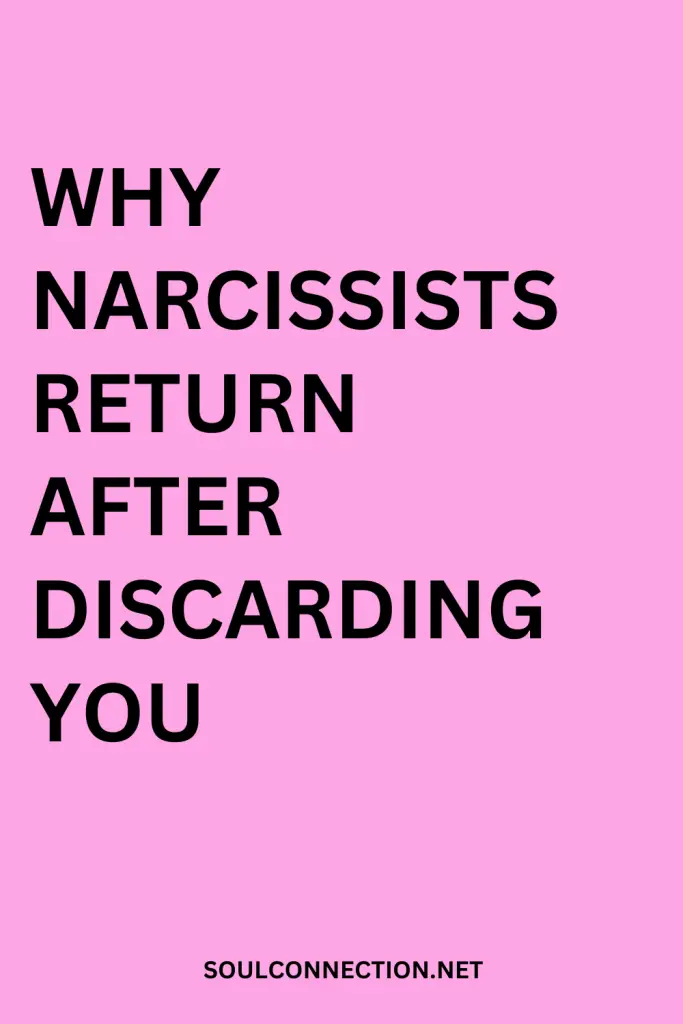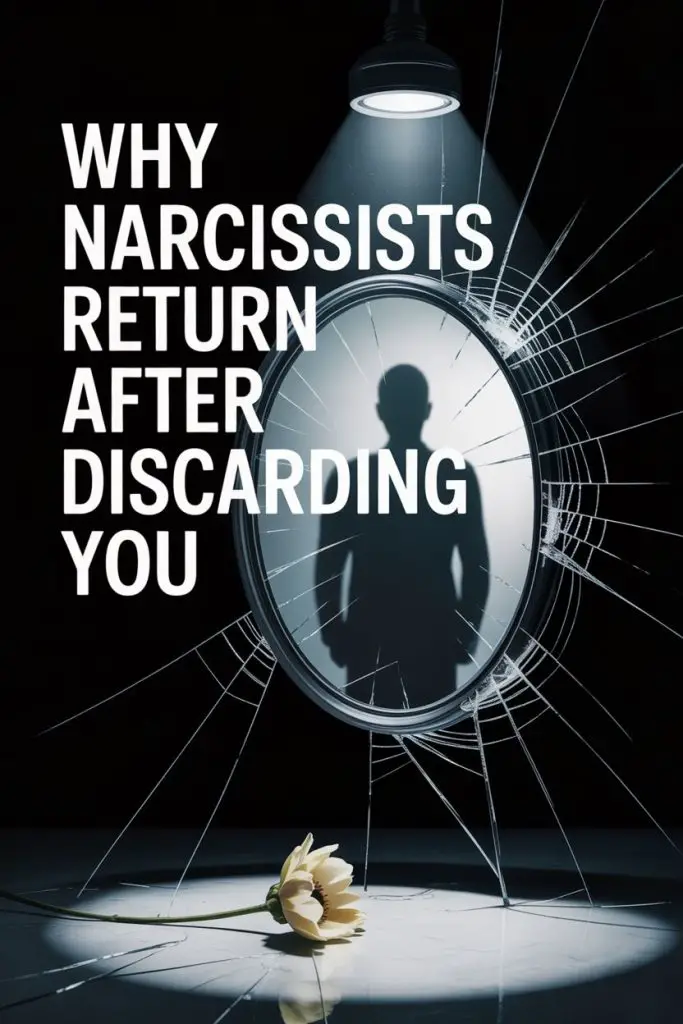Breakups with narcissists often feel like emotional whiplash. One minute you’re the center of their universe, the next you’re left on read, wondering what on earth you did to deserve the silent treatment.
And just when you’ve started to pick yourself up and rediscover the joys of solo Netflix marathons, there they are again—sliding into your DMs with a casual “Hey stranger.” What gives?
Narcissists have a knack for reappearing in your life like a bad sitcom reboot. It’s less about unfinished business and more about their own needs.
If you’ve ever wondered why they boomerang back after discarding you, let’s pull back the curtain and see what’s really going on behind the scenes.
The Ego’s Unfinished Business
For narcissists, relationships aren’t partnerships—they’re sources of supply. Think of it as emotional fuel: admiration, attention, validation.
When they discard you, it’s often because they’ve found a shinier toy, or you’ve threatened their sense of control. But unlike regular folks, narcissists rarely close the chapter for good.
Why? That ego of theirs doesn’t like the idea of anyone moving on without them. If you start to glow up, find new confidence, or (heaven forbid) show evidence of a life that doesn’t include them, it scratches at their pride.
Suddenly, their ego demands reassurance: “Am I really so replaceable?” You’ll often notice their return lines up suspiciously well with you posting a cute photo, landing a new job, or simply not pining after them.
You Were Never a Person, You Were a Mirror
Here’s the uncomfortable truth: narcissists don’t love people—they love reflections of themselves. You, dear reader, were valuable as long as you mirrored back admiration, awe, and devotion.
When that mirror cracks (say, you set a boundary), the narcissist feels exposed and retreats.
But mirrors are hard to come by, especially ones that gave them such a flattering reflection. So when their new supply gets tired of the drama, or they need a quick ego boost, they come knocking.
It’s less about missing you and more about missing how you made them feel. If you start to recognize this, their reappearances begin to look a lot less like romantic gestures and a lot more like late-night snack runs—craving, not caring.
The Fear of Abandonment in Disguise
Narcissists are famous for looking like they couldn’t care less, but underneath all that bravado is a deep fear of abandonment. It’s ironic, really. They discard you, but panic if you actually detach.
The prospect of you moving on terrifies them—not because they love you, but because it reminds them of their own emptiness.
Their return isn’t about rekindling a lost love. It’s about soothing their own anxiety. If they can rope you back in, even just for a chat, it reassures them that they still have the power to affect your life.
In that sense, you become a safety net for their self-esteem. Not exactly the recipe for a rom-com, is it?
Breadcrumbing and the Art of Keeping Doors Open
Ever notice how a narcissist’s return is rarely accompanied by a heartfelt apology? Instead, it’s a breadcrumb: an innocuous text, a cryptic like on your Instagram story, or a “random” meme sent at 2am.
This isn’t a grand gesture of love. It’s a tactic.
Breadcrumbing lets them keep the door open without putting in real effort. You’re not quite together, but you’re not quite free, either. If you engage, it reassures them that you’re still an option.
If you ignore them, expect another crumb soon after—narcissists aren’t known for picking up subtle hints.
Here’s the kicker: responding to these crumbs often restarts the whole cycle. Before you know it, you’re back on the roller coaster, clutching your phone and questioning your own sanity.
The Game of Power and Control
For narcissists, relationships are a game—and they play to win. Walking away with your dignity? That’s a move they can’t stand. If you set boundaries or show signs of healing, they may return just to reassert control.
This might come in the form of love bombing (those over-the-top declarations you used to fall for) or guilt-tripping (“I’ve been thinking about us a lot lately…”).
The goal isn’t reconciliation—it’s domination. If they can pull you back in, it proves their power. If you resist, expect a fresh round of manipulation.
And yes, this is exhausting. Your energy is better spent rearranging your sock drawer.
Curiosity Killed the Narcissist’s Cool
Few things bother narcissists more than being excluded from the narrative. If you cut off contact, start seeing someone new, or simply refuse to engage, their curiosity spikes. “What are they up to? Are they happier? Are they over me?”
This isn’t a harmless curiosity—it’s a need to know they still matter. Your indifference is kryptonite to their ego. Their return often carries a whiff of “just checking in,” but what they really mean is, “Please remind me that I’m still relevant.”
If you’re tempted to respond, ask yourself: are you giving them closure, or just more material for their next disappearing act?
The Recycled Script
Narcissists don’t exactly have a wide emotional range. Their tactics follow a predictable script: idealize, devalue, discard, return. Rinse, repeat. This isn’t a coincidence. It’s a pattern.
Their return is rarely a sign of genuine change. More often, it’s an attempt to restart the cycle—especially if their new supply isn’t panning out.
Unfortunately, the drama is what keeps them invested. If they sense you’re susceptible to the old tricks, they’ll play the hits.
Recognizing this pattern is the first step toward breaking it. If their return feels eerily similar to last time, trust your instincts. Spoiler: Season 2 is never better than Season 1.
What You Can Do Tonight
Spotting these return tactics is one thing—resisting them is another. Here are some practical ways to protect your peace, starting right now:
- Go Low or No Contact: Block, mute, unfollow. The less access they have, the less power they wield.
- Resist the Breadcrumbs: Crumbs aren’t meals. Don’t mistake occasional attention for genuine care.
- Lean on Your Circle: Talk it out with friends who get it. Sometimes you need a witness to remind you you’re not imagining the madness.
- Write Down Your Why: List the reasons you walked away. Nostalgia has a funny way of airbrushing the bad bits.
- Protect Your Energy: You have better things to do than play emotional ping-pong. Self-care isn’t selfish.
The Good News for Your Future
Recovering from a narcissistic discard isn’t easy, but their return doesn’t have to send you back to square one. Each time you resist the urge to reply, you reclaim a little more of your power.
The more you understand their motivations, the less personal their actions feel.
Narcissists are drawn to those who reflect their shine—but you get to decide when (and if) you switch the lights back on. When you stop feeding the cycle, you rob them of the only currency they value: your attention.
Here’s the upside: that freedom you’ve been craving? It’s already within reach.
The next time an ex-narcissist pops up, you can smile, sip your tea, and carry on living a life that doesn’t revolve around anyone’s ego except your own. And that, my friend, is the plot twist they never saw coming.


